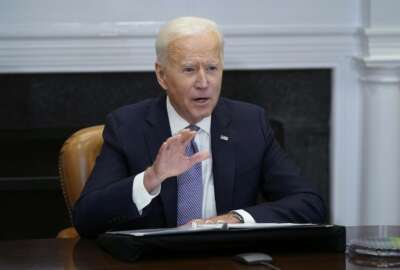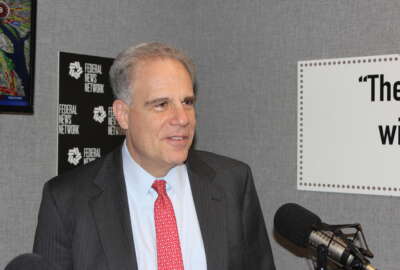
DEA has a foundation, and it’s been up to some star-studded work
You might not have realized the Drug Enforcement Administration has a foundation, but it's been working for 20 years to help young people find healthy alternatives...
Best listening experience is on Chrome, Firefox or Safari. Subscribe to Federal Drive’s daily audio interviews on Apple Podcasts or PodcastOne.
You might not have realized the Drug Enforcement Administration has a foundation. It’s been working for 20 years to help young people find healthy alternatives to drug use. It recently held a major fundraiser in connection with some big stars of Broadway. The DEA Education Foundation’s Chairman of the Board Bill Alden spoke to Federal Drive with Tom Temin for the details.
Interview transcript:
Tom Temin: Mr. Alden, good to have you on.
Bill Alden: Well, thank you, Tom. It’s a pleasure for me to be on today.
Tom Temin: Tell us about the foundation itself. I was surprised to find that there is a DEA Educational Foundation in the first place.
Bill Alden: Yes, well, we started the foundation – by “we” I mean myself, and another former agent at the time in 2001. I am a former DEA special agent I served 28-and-a-half years as a DEA special agent. And my last nine years I spent in Washington, D.C. at DEA headquarters and I headed the Office of Congressional and Public Affairs at the time. And so when I retired, and I retired quite a while ago, in 1993, several of us were interested in doing something to support the DEA mission, and frankly, to help kids stay off of drugs and to provide them with healthy alternatives. With the COVID-19 pandemic, we had to fairly quickly switch gears and go from live events and live programming to virtual events. We were able to do that successfully. And we’ve maintained our afterschool programming, which includes the afterschool DEA youth dance program, and other programs virtually in almost all the cities that we had been live before prior to. So we’re very happy about the ability for us to be flexible, and to provide an opportunity for kids to still participate in our programming. Because as you probably are aware, with COVID, most of the schools are closed, and the kids are, frankly, quite bored. And so to give them an opportunity to still participate with their instructors is very, very healthy for them. And they’re very excited to participate.
Tom Temin: All right, and give us some idea of the types of events you do to raise funds for these activities. And maybe let’s start with the most recent Broadway event.
Bill Alden: This was our second virtual fundraiser event that we had. We had the first one that we tried out in October, where we worked with a media organization, PR company in Nashville, Tennessee, called PLA Media. And we were able to acquire the services, the volunteer services of several country music stars. And I was able to convince my friend Gary Morris, who I met several years ago at an event – who was in 1982, the country music singer of the year and then went to Broadway later on and played the role of Jean Valjean and “Les Misérables.” And also he played the lead in “La Bohème.” So Gary was really interested in helping us. And so I was able to convince him and he introduced us to PLA Media. And so we had our first fundraiser in October – a virtual fundraiser we had various country stars perform for us. And it was successful. And we had a really good experience. And it was Gary who suggested because of his experience on Broadway that we try a Broadway event later on, which we put together. And we had, at the end of March this past year. We worked again with Gary Morris. He was our co-host along with Rema Webb from “The Color Purple” and several other major Broadway musicals. We had the opportunity to solicit many others in the field and we got tremendous cooperation from the Broadway performers. And they all volunteered their time to be helpful. In most cases they performed. In other cases, they gave us a what we call a shout out, talking about the Educational Foundation, the impact that we had, and the fact that it was a good program, particularly for children.
Tom Temin: We’re speaking with Bill Alden. He’s chairman of the board of the DEA Educational Foundation. And if you would just tell us a little bit more in detail about the programs that you do run. You mentioned a youth dance program. What types of kids do they serve and where do they take place?
Bill Alden: Yeah, we have our anchor program. It’s our oldest program called the DEA Educational Foundation Youth Dance Program and it uses professional dance companies as instructors. We hire and we vet and we do backgrounds and we train various dance company participants around the country. Prior to COVID-19 we were in 50 cities across the U.S. and we provide a platform that is afterschool – usually in the school somewhere afterwards where the dance instructor then worked with kids, up to 30 kids at a time, to help teach them the healthy activity of dance, which is extremely, extremely popular. I must say that there is no cost to the schools, no cost to the community, no cost to the students. The cost of the program is completely absorbed by the DEA Education Foundation. That’s in part why we have to have fundraisers, like we just recently had.
Tom Temin: And you have a pretty long history of dealing with the stars of stage and screen and tell us about the involvement with the “Breaking Bad” crew. Because that’s kind of ironic, since it glorified someone that produced methamphetamines and had them distributed around. You we’re involved with them and they were helpful to the foundation.
Bill Alden: Exactly. Back in 2016, at the Beverly Hilton Hotel, we had an event where we honored Vince Gilligan, who is the creator and producer and director of “Breaking Bad.” We also honored all the actors and writers and producers who are involved in “Breaking Bad.” And the reason we did it was because in the portrayal of “Breaking Bad,” whenever there was a scene where there was methamphetamine use or abuse, it was portrayed accurately. And it wasn’t gratuitous in any way, form, like a lot of other TV shows, and other movies where they present gratuitous drug use inaccurately and without consequences. Well, we believe that Vince did an honest job in presenting the facts as they exist. And he always presented the realistic impact of methamphetamine on the abuser or user at the time. So there were consequences. There were also consequences for Walter White, who was played by Bryan Cranston. We became friends and associates with a lot of the actors and producers and Vince Gilligan himself, who has been extremely supportive of the DEA Educational Foundation; Dean Norris, who played the DEA Special Agent Hank Schrader, has become a very good supporter and friend and colleague of the DEA Educational Foundation, as has Bryan Cranston. And we reached out to Bryan this time, and asked him to participate because of his experience on Broadway, and because of the name recognition and he agreed to do a shout out for us. And we opened with it on the virtual fundraiser that we had two weeks ago.
Tom Temin: Fantastic. So what do you plan on coming up with? And if people are able to get together again, do you have any programs for fundraising planned?
Bill Alden: Yeah, that’s a good question. You know, we had talked honestly about doing another live event in New York City this coming fall. But we’re really concerned that our timing may be a little premature. And so we’re going to have a call, actually Monday, internally to do some brainstorming. And I’m quite sure we’re going to delay any live events until the spring of 2022. And they could possibly be in L.A., Las Vegas or New York City. And right now, we’re kind of uncertain about the timing and the location. But that’s what we’re talking about. The earliest possible live event for us will be the spring of 2022.
Tom Temin: And final question, what kind of interest do you get from the agency itself? Are you in connection with them? And do they have input into the programs and that kind of thing?
Bill Alden: I always talked about we’re the perfect example of a public-private partnership, and I think that we are and we have been for the last 20 years. DEA provides guidance. They help us with some programming. We’re treated as oftentimes as another organization in the prevention research education field. And so some of our programming is attractive to DEA, some of it is utilized by DEA, but not all of it, because we do so many different things. But I consider and we consider – the DEA Educational Foundation considers DEA to be a full fledged partner of our efforts, and we work with them constantly. And we work with the various field divisions throughout the United States, that helped us with our programming.
Tom Temin: Bill Alden is chairman of the board of the DEA Educational Foundation, and former chief of Congressional and Public Affairs at the DEA. Thanks so much for joining me.
Bill Alden: You’re welcome, Tom. It’s been a real pleasure.
Tom Temin: We’ll post this interview along with a link to more information at FederalNewsNetwork.com/FederalDrive. Subscribe to the Federal Drive at Podcastone or wherever you get your shows.
Copyright © 2025 Federal News Network. All rights reserved. This website is not intended for users located within the European Economic Area.
Tom Temin is host of the Federal Drive and has been providing insight on federal technology and management issues for more than 30 years.
Follow @tteminWFED
Related Stories

White House announces nominations for leadership roles at DEA, Army, and others




